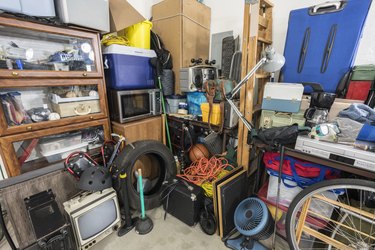
If you're not using those extra pillows or that heavy-duty comforter, the closest mice would be happy to tear them apart and settle down. Mice like to build their nests in undisturbed areas that are close to food sources using whatever materials are available, especially fabric. Finding a cache of cozy bedding in a garage or other storage space is like hitting pay dirt for nesting mice. Mouse damage can't be undone, so storing your bedding properly is the only way to protect it from rodents.
Start With Clean Bedding
Video of the Day
It's a good idea to wash bedding before you put it in storage in any case. Any stains and odors are going to be easier to get out now than after the bedding has been sitting in a box for months. Storage conditions also tend to encourage bacteria growth, so you should always get things as clean as possible before putting them away.
Video of the Day
Washing bedding is especially important if you've been dealing with mice or any other kind of household infestation. Mice have a powerful sense of smell and are highly motivated to get at any trace of food they can smell. If someone ate in bed while using an extra comforter and there are still food crumbs clinging to it, you don't want to pack it away in a basement or garage where rodents and insects might detect it and try to tear through packaging to get at it.
Follow label directions to wash all your bedding with the appropriate detergent and dry it all completely. Do not put any blankets, pillows or other bedding in storage if any of the material is even slightly damp. Even if items are safe from mice, they may be destroyed by mold.
Pack Bedding in Rodent-Resistant Containers
Because mice can chew through them, cardboard and plastic bags generally aren't the best materials for storing extra bedding. Mice can easily get into garbage bags and the kind of zippered clear vinyl bags that people might use for under-bed storage.
The best way to protect bedding and other fabric from mice is to pack the items in rodent-resistant storage boxes. Any storage container that's made of sturdy, inflexible plastic (like the plastic in a curbside recycling bin) and has a locking or latching lid will work. If you have limited storage space and are concerned that bulky storage bins will take up too much space, use a vacuum storage bag system to compress bedding into plastic bags first so that many items can fit inside each bin.
Keep in mind that storing bedding off the ground won't necessarily protect it from mice. They can scale crowded shelves with ease. If you want to keep things like sheets, thin blankets and other smaller items stored on shelves, look for latching plastic bins designed for food storage. These bins should keep mice out of your fabrics without taking up too much space.
What About Mattresses?
Mice will just as happily dig into an unused mattress as they will the bedding used to cover it, but there's no plastic storage container big enough to protect a mattress you're not using. There's also no fully rodent-proof mattress cover or bag since determined mice can get through the materials used to make these protective covers. It's a risk to store a mattress in a place where you believe there might be mouse activity.
Keep Mice Away
There's no one miracle product or solution that will keep mice away from your home for good. If you've found droppings, heard mice skittering or seen any signs of mice nesting or chewing through materials in storage areas, like your garage or basement, DIY mouse deterrents probably aren't going to solve the problem. It may require help from a pest control service to locate and seal off entry points and get rid of any mice already in the space.
If you want to try a DIY solution to keep mice away, some people have had success using peppermint as a natural mouse deterrent. Soak cotton balls in peppermint oil and place a few of them around the containers where your stored bedding is kept but only if you don't have pets with access to the area. Licking or ingesting a cotton ball soaked with peppermint oil could be dangerous for a curious dog or cat. Replace the cotton balls whenever the smell starts to fade.